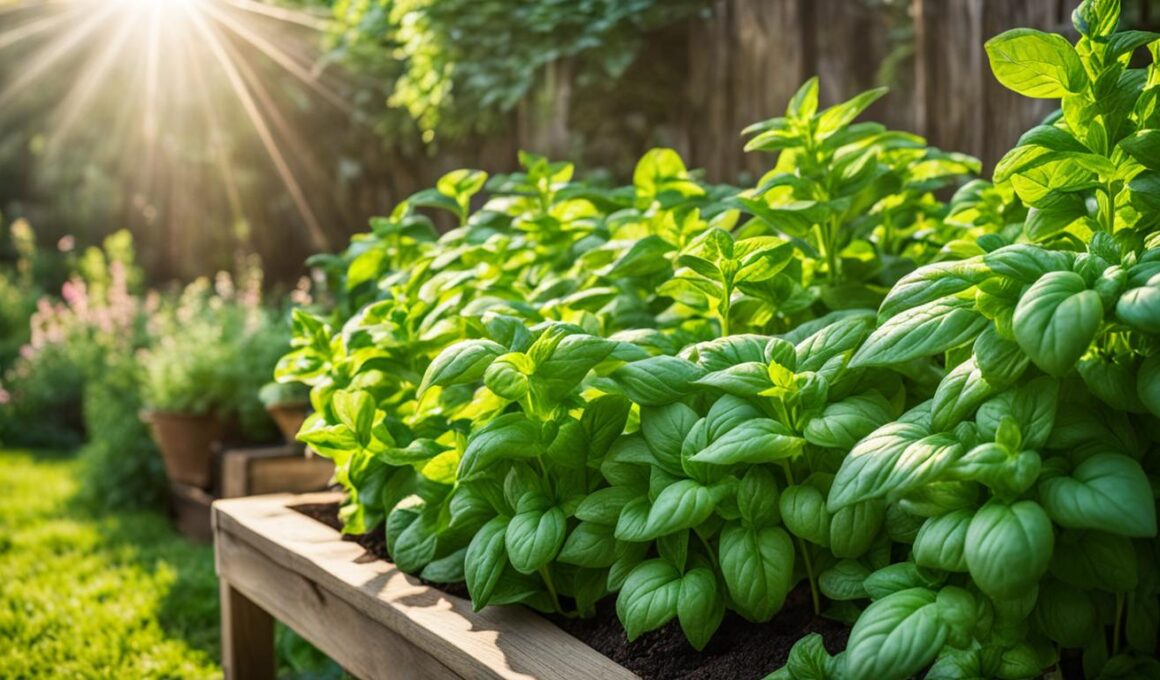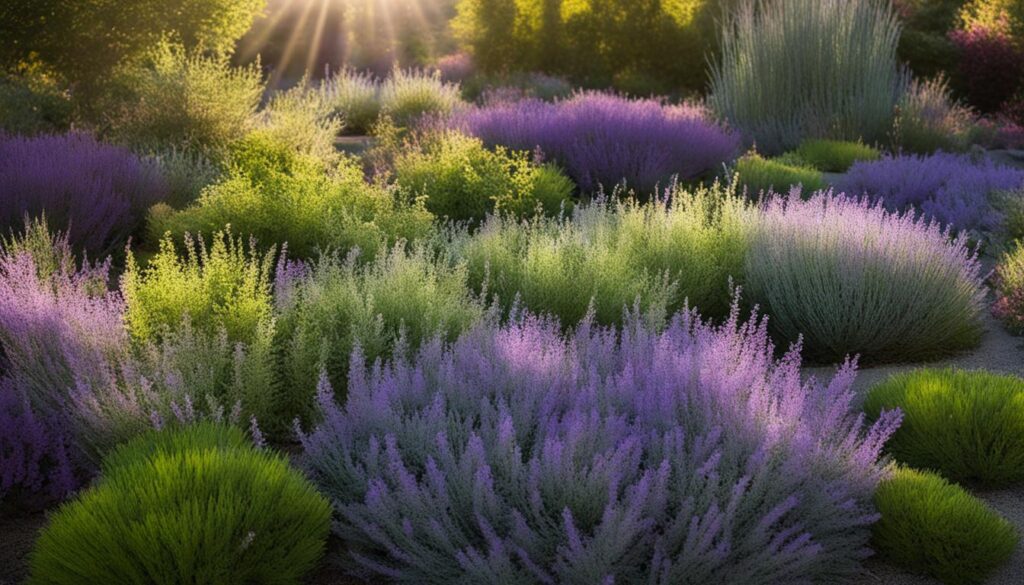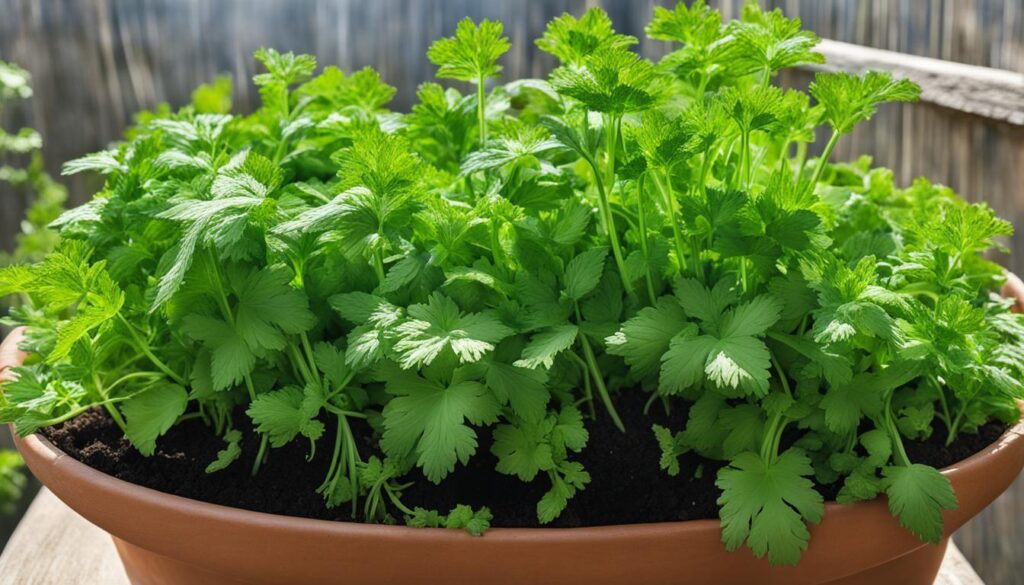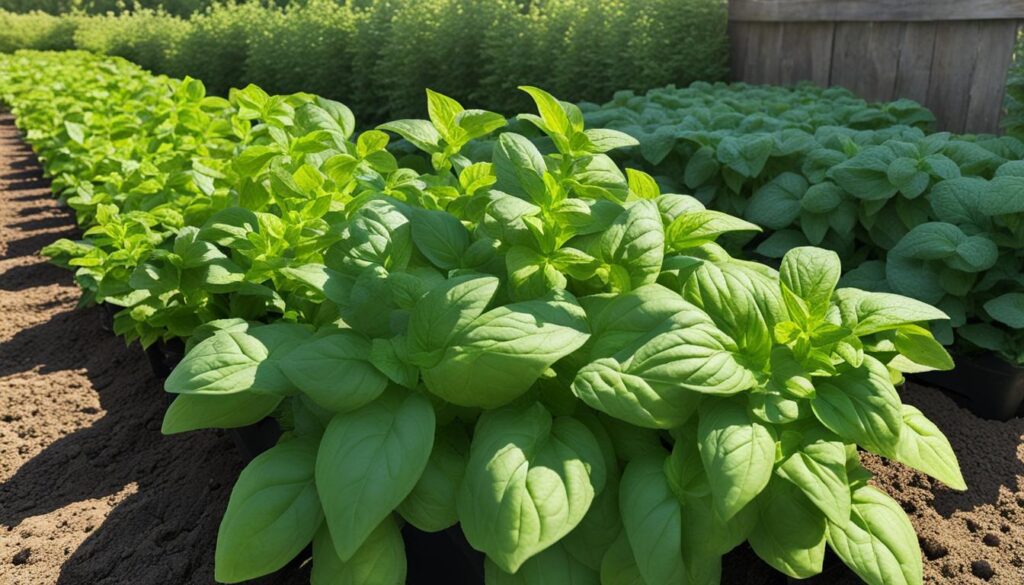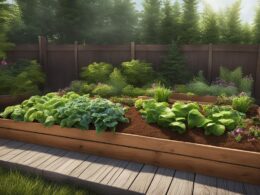Growing herbs can be a rewarding experience, and companion planting herbs together is a great way to maximize their growth and benefits. Basil and mint can be grown together in an herb garden or in pots, as they have complementary growing habits and requirements. Keep reading to discover the secrets of successfully growing basil and mint together.
Key Takeaways:
- Companion planting herbs can maximize their growth and benefits
- Basil and mint have complementary growing habits and requirements
- Successful herb gardening involves considering the specific needs of each herb
- Planting herbs together can enhance flavors, attract beneficial insects, and create a visually appealing garden
- By following companion planting principles, you can successfully grow basil and mint together
Herbs to Plant Together: Thyme, Rosemary, and Sage
When it comes to companion planting herbs, thyme, rosemary, and sage make a fantastic trio. These Mediterranean herbs not only thrive together but also offer a range of benefits for your garden. By planting them together, you can create a visually appealing herb garden while attracting beneficial insects that contribute to a healthy ecosystem.
Thyme, rosemary, and sage share similar soil and sunlight requirements, making them perfect companions. They enjoy well-drained soil and thrive in full sun. When planted together, these herbs can complement each other’s growth and enhance the overall flavor profile of your dishes.
One of the key benefits of planting thyme, rosemary, and sage together is their ability to attract beneficial insects. Bees and butterflies are naturally drawn to their fragrant flowers, helping with pollination in your garden. Additionally, these herbs have natural repellent properties that can deter pests like moths and beetles.
Get creative with these herbs by incorporating them into your favorite recipes. Whether you’re seasoning roasted vegetables or infusing oils and vinegars, thyme, rosemary, and sage add depth and complexity to your culinary creations. With their attractive foliage and remarkable fragrances, these herbs will not only enhance your garden but also elevate your culinary experience.
Key Points:
- Thyme, rosemary, and sage are Mediterranean herbs that can be planted together.
- They have similar soil and sunlight requirements, making them ideal companions.
- Planting thyme, rosemary, and sage together can attract beneficial insects like bees and butterflies.
- These herbs have natural repellent properties against pests like moths and beetles.
- Thyme, rosemary, and sage can be used together in recipes to add depth and complexity.
Herbs to Plant Together: Basil, Parsley, and Cilantro
When it comes to herb gardening, planting basil, parsley, and cilantro together is a winning combination. These herbs not only have similar growing habits but also complement each other in terms of flavors. Basil, with its fragrant and slightly sweet taste, beautifully enhances the fresh and vibrant flavors of parsley and cilantro.
In terms of growing habits, basil, parsley, and cilantro thrive in well-drained soil and require moderate watering. Planting them together in an herb garden or in pots provides them with the ideal conditions they need to flourish. This trio of herbs creates a balanced ecosystem, where basil acts as a natural pest repellent, deterring pests like mosquitoes and flies. On the other hand, parsley and cilantro attract beneficial insects, such as pollinators, that can help with pest control.
Whether you’re adding them to salads, soups, or pasta dishes, the combination of basil, parsley, and cilantro brings a burst of freshness and depth to your culinary creations. Their complementary flavors add complexity, making your dishes more flavorful and enjoyable. So, consider planting these herbs together to create a thriving herb garden that not only enhances your cooking but also supports natural pest control.
Benefits of Growing Basil, Parsley, and Cilantro Together:
- Complementary flavors add freshness and depth to dishes
- Basil acts as a natural pest repellent
- Parsley and cilantro attract beneficial insects for pest control
- Thrives in well-drained soil with moderate watering
Quick Tips for Growing Basil, Parsley, and Cilantro Together:
- Choose a sunny spot for your herb garden or use pots with good drainage
- Water regularly to keep the soil moist but not waterlogged
- Harvest leaves regularly to encourage new growth
- Consider companion planting with other herbs for a diverse and balanced garden
Herbs to Plant Together: Chives, Mint, and Oregano
Chives, mint, and oregano are a perfect trio of herbs to plant together in your garden or pots. Not only do they have complementary flavors, but they also offer great natural pest control benefits. When you plant these herbs together, you create a harmonious combination that will enhance your culinary creations and keep pesky insects at bay.
The Benefits of Growing Chives, Mint, and Oregano Together
Chives, with their mild onion flavor, pair beautifully with the refreshing taste of mint and the bold, earthy flavor of oregano. When used together, these herbs can add depth and complexity to your dishes, taking your culinary creations to the next level. Additionally, mint and chives both have natural pest-repelling properties, helping to keep unwanted insects away from your herb garden. Oregano, on the other hand, can deter specific pests, making it an excellent companion plant for your other herbs.
Tips for Growing Chives, Mint, and Oregano Together
To ensure successful growth and a harmonious herb garden, here are a few tips for growing chives, mint, and oregano together:
- Choose a location that receives ample sunlight, as these herbs thrive in full sun conditions.
- Provide well-draining soil to prevent waterlogged roots and promote healthy growth.
- Regularly prune and trim mint to prevent it from taking over the container or garden bed.
- Water the herbs regularly, but be mindful not to overwater, as they prefer moderate watering.
By following these tips and planting chives, mint, and oregano together, you can create a visually appealing herb garden while enjoying the complementary flavors and natural pest control benefits these herbs offer.
Planting chives, mint, and oregano together not only adds visual interest to your herb garden but also provides a practical solution for flavor enhancement and pest control. With their complementary flavors and natural abilities to repel pests, these herbs are a winning combination that will elevate your culinary endeavors and ensure a thriving herb garden.
Herbs to Plant Together: Dill and Fennel
When it comes to companion planting, dill and fennel make excellent partners in your herb garden. These two herbs have similar growth habits and can be planted together without any negative effects on each other’s development. Their compatibility allows you to maximize space and create a harmonious environment for these aromatic plants to thrive.
Dill attracts beneficial insects such as ladybugs, lacewings, and hoverflies, which feed on harmful pests like aphids and caterpillars. By planting dill alongside fennel, you can help control pest populations naturally, promoting a healthier garden ecosystem. Additionally, both dill and fennel have distinct flavors that can complement various culinary dishes, making them a delightful addition to your kitchen.
Remember that dill and fennel are tall-growing herbs, so it’s essential to provide adequate spacing between the plants to avoid overcrowding. Regular pruning and harvesting of mature leaves will also help maintain the desired shape and prevent the herbs from overshadowing other plants in the garden. Together, dill and fennel create a visually appealing and functional herb garden, offering both aesthetic and practical benefits.
Growth Habits and Pest Control Tips
- Dill and fennel have similar soil requirements and can thrive in well-drained soil.
- Both herbs prefer full sun, so ensure they receive at least six hours of direct sunlight daily.
- Plant dill and fennel at least 2-3 feet apart to allow sufficient space for their vertical growth.
- Regularly monitor the plants for pests and remove any infected leaves promptly.
- Encourage beneficial insects by avoiding the use of chemical pesticides.
“Planting dill and fennel together not only ensures the healthy growth of these herbs but also contributes to a thriving garden ecosystem.”
– Herb Gardening Magazine
So, if you’re looking to create a beautiful and functional herb garden, don’t forget to include dill and fennel as companion plants. Their compatibility, growth habits, and pest control properties make them a winning combination. Enjoy the bountiful harvest and the delightful flavors these herbs bring to your culinary adventures.
Herbs to Plant Together: Lemon Balm, Lemon Verbena, and Lemon Thyme
When it comes to creating a vibrant herb garden, incorporating lemon-scented herbs can add a delightful fragrance and flavor to your culinary creations. Lemon balm, lemon verbena, and lemon thyme are three herbs that not only share a lemony aroma but also possess excellent pest control properties, enhancing the overall health of your garden.
Benefits of Lemon Balm
Lemon balm, also known as Melissa officinalis, is a versatile herb with a zesty lemon fragrance. Along with its citrusy aroma, lemon balm has natural insect-repelling properties that help deter pests from your garden. This herb is also known to attract bees, butterflies, and other beneficial insects, contributing to a thriving pollinator-friendly environment. Whether used for teas, salads, or infused oils, lemon balm adds a refreshing twist to your culinary endeavors.
Discover the Magic of Lemon Verbena
Lemon verbena, scientifically known as Aloysia citrodora, is a perennial herb that exudes a strong lemon scent. Its leaves can be used to make fragrant teas, syrups, and desserts. Similar to lemon balm, lemon verbena possesses natural pest-repelling properties, making it an excellent addition to your herb garden. Its tall, slender growth adds an elegant touch to the landscape while providing a fresh citrus aroma with every brush against its leaves.
The Lemony Allure of Lemon Thyme
Lemon thyme, or Thymus citriodorus, is a cultivar of common thyme with a distinct lemony scent. This low-growing herb thrives in full sun and well-drained soil, making it a suitable companion for lemon balm and lemon verbena. Lemon thyme not only adds a delightful flavor to a variety of dishes, but its natural oils also help repel pests, contributing to a healthier garden environment.
Plants like lemon balm, lemon verbena, and lemon thyme not only bring a refreshing citrus aroma to your herb garden but also offer pest control benefits. By planting these lemon-scented herbs together, you can create a beautiful and aromatic space while naturally deterring unwanted visitors.
So, if you’re looking to infuse your herb garden with the invigorating scent of lemons and keep pests at bay, consider planting a trio of lemon balm, lemon verbena, and lemon thyme. These herbs will not only add a burst of flavor to your culinary creations but also contribute to a thriving and pest-free garden environment.
Conclusion
To successfully grow basil and mint together, companion planting herbs is the key. By selecting herbs with complementary growing habits and requirements, you can create a thriving and diverse herb garden. Consider the specific needs of each herb, their pest-repelling or attracting properties, and you’ll be on your way to successful herb gardening.
Planting basil and mint together in your herb garden or in pots not only maximizes their growth but also enhances their flavors. These herbs have distinct tastes that can be combined to create delicious recipes. When grown together, they can attract beneficial insects while repelling pests, creating a balanced ecosystem in your garden.
Companion planting herbs also adds visual interest to your herb garden. The different shapes, sizes, and colors of basil and mint plants create an aesthetically pleasing arrangement. With proper care and maintenance, you can enjoy the benefits of companion planting and create a visually appealing garden.
So, go ahead and start your herb garden with basil and mint together using the principles of companion planting. With these tips and secrets, you can successfully grow these herbs and experience the joys of successful herb gardening.
Is it Possible to Grow Basil and Mint Together in the Same Pot?
Yes, it is possible to grow basil and mint together in the same pot. Both are compatible in terms of sunlight, watering, and soil requirements, making them ideal companions for growing herbs in pots. Just ensure the pot is big enough for both to thrive without competing for resources.
FAQ
Can basil and mint be grown together?
Yes, basil and mint can be grown together in an herb garden or in pots as they have complementary growing habits and requirements. Planting them together can maximize their growth and benefits.
What other herbs can be planted together with thyme, rosemary, and sage?
Other Mediterranean herbs like thyme, rosemary, and sage can be planted together in a garden bed or in pots. They have similar soil and sunlight requirements and complement each other’s growth.
Can basil, parsley, and cilantro be planted together?
Yes, basil, parsley, and cilantro can be planted together in an herb garden or in pots. They have similar growing habits and can thrive in the same conditions, enhancing each other’s flavors.
What are good companion plants for chives, mint, and oregano?
Chives, mint, and oregano can be planted together to create a visually interesting herb garden. Mint and chives have pest-repelling properties, while oregano can deter certain pests.
Can dill and fennel be planted together?
Yes, dill and fennel are considered good companion plants for each other. They have similar soil requirements and can be planted together without affecting each other’s growth.
Which herbs can be planted together for a lemony flavor?
Lemon balm, lemon verbena, and lemon thyme can be planted together in an herb garden or in pots. Their lemony flavors can enhance many culinary dishes.
How can I grow basil and mint together successfully?
By selecting herbs with complementary growing habits and requirements, you can create a thriving and diverse herb garden. Consider the specific needs of each herb and their pest-repelling or attracting properties.





